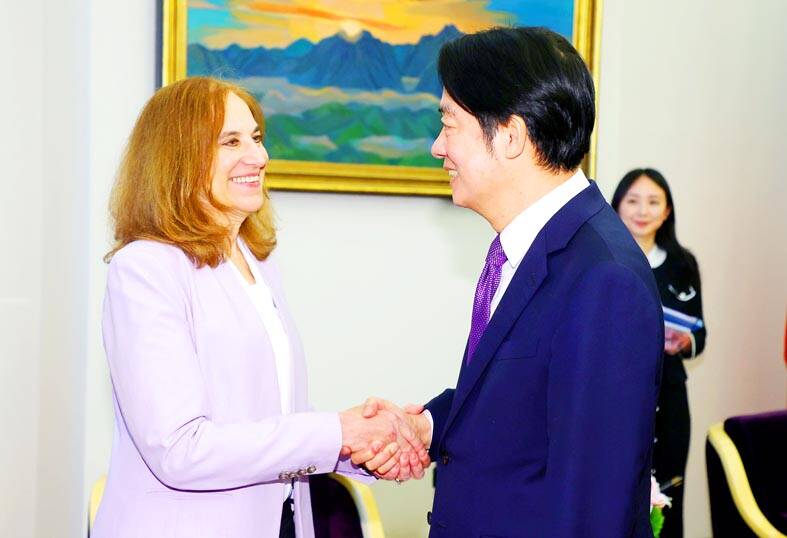Maintaining the “status quo” in the Taiwan Strait, and peace and stability in the Indo-Pacific region must be a top priority, president-elect William Lai (賴清德) said yesterday after meeting with a delegation of US academics.
Leaders of the G7, US President Joe Biden and other international heads of state have voiced concerns about the situation in the Strait, as stability in the region is necessary for a safe, peaceful and prosperous world, Lai said.
The vice president, who is to be inaugurated in May, welcomed the delegation and thanked them for their support for Taiwan and issues concerning the Strait.

Photo: CNA
The international community closely observed the Jan. 13 presidential and legislative elections in Taiwan, waiting to see how Taiwanese would cast their ballots when faced with China’s military threats and propaganda, he added.
Taiwanese voted for the country to work more closely with other democratic countries, he said.
Situated in the first island chain, Taiwan is directly threatened by China, “but we know our responsibility, and we will do our best to maintain peace and stability in the Indo-Pacific region,” he said.
Taiwan hopes the international community would continue to show concern over the situation in the Strait, as maintaining regional peace and stability can only be achieved by working together with the global community, he added.
While continuing to be a crucial part of the international supply chain, Taiwan hopes to obtain more significant support from the US government and the international community for the nation’s inclusion in regional economic organizations, Lai said.
Instability in China’s economy and government, as well as a more hostile environment across the Strait, have led to many Taiwanese businesses pulling out of China and investing in the US, Japan, the EU and other parts of the Indo-Pacific region, he said.
If Taiwan can work with other countries in a regional framework, it would bolster the nation’s industrial development, he added.
Members of the delegation included German Marshall Fund Indo-Pacific Program managing director Bonnie Glaser, Eurasia Group China practice managing director Rick Waters, American Enterprise Institute senior fellow Zack Cooper and Freeman chair in China Studies at the US Center for Strategic and International Studies Jude Blanchette.

ENDEAVOR MANTA: The ship is programmed to automatically return to its designated home port and would self-destruct if seized by another party The Endeavor Manta, Taiwan’s first military-specification uncrewed surface vehicle (USV) tailor-made to operate in the Taiwan Strait in a bid to bolster the nation’s asymmetric combat capabilities made its first appearance at Kaohsiung’s Singda Harbor yesterday. Taking inspiration from Ukraine’s navy, which is using USVs to force Russia’s Black Sea fleet to take shelter within its own ports, CSBC Taiwan (台灣國際造船) established a research and development unit on USVs last year, CSBC chairman Huang Cheng-hung (黃正弘) said. With the exception of the satellite guidance system and the outboard motors — which were purchased from foreign companies that were not affiliated with Chinese-funded

PERMIT REVOKED: The influencer at a news conference said the National Immigration Agency was infringing on human rights and persecuting Chinese spouses Chinese influencer “Yaya in Taiwan” (亞亞在台灣) yesterday evening voluntarily left Taiwan, despite saying yesterday morning that she had “no intention” of leaving after her residence permit was revoked over her comments on Taiwan being “unified” with China by military force. The Ministry of the Interior yesterday had said that it could forcibly deport the influencer at midnight, but was considering taking a more flexible approach and beginning procedures this morning. The influencer, whose given name is Liu Zhenya (劉振亞), departed on a 8:45pm flight from Taipei International Airport (Songshan airport) to Fuzhou, China. Liu held a news conference at the airport at 7pm,

Taiwan was ranked the fourth-safest country in the world with a score of 82.9, trailing only Andorra, the United Arab Emirates and Qatar in Numbeo’s Safety Index by Country report. Taiwan’s score improved by 0.1 points compared with last year’s mid-year report, which had Taiwan fourth with a score of 82.8. However, both scores were lower than in last year’s first review, when Taiwan scored 83.3, and are a long way from when Taiwan was named the second-safest country in the world in 2021, scoring 84.8. Taiwan ranked higher than Singapore in ninth with a score of 77.4 and Japan in 10th with

GRIDLOCK: The National Fire Agency’s Special Search and Rescue team is on standby to travel to the countries to help out with the rescue effort A powerful earthquake rocked Myanmar and neighboring Thailand yesterday, killing at least three people in Bangkok and burying dozens when a high-rise building under construction collapsed. Footage shared on social media from Myanmar’s second-largest city showed widespread destruction, raising fears that many were trapped under the rubble or killed. The magnitude 7.7 earthquake, with an epicenter near Mandalay in Myanmar, struck at midday and was followed by a strong magnitude 6.4 aftershock. The extent of death, injury and destruction — especially in Myanmar, which is embroiled in a civil war and where information is tightly controlled at the best of times —